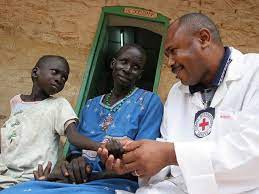- February 22, 2022
- Posted by: humanitarianweb
- Category: Humanitarian News

Access to health care remains a major concern for a vast majority of Afghans. Thousands of health facilities have closed or are not functioning anymore, and most people can’t afford treatment in private clinics anymore nor travel to neighbouring countries.
Many patients endure long journeys to seek treatment in public structures. Families of the patients can’t always afford the accommodation nor medicine that isn’t provided for free by the hospitals. They sleep in waiting areas and patients are sometimes discharged without treatment.
While the lack of access to health care remains to be a worrying issue, the country is also facing a shortage of COVID-19 vaccine accessibility on the other front. According to WHO, only about 10 per cent of the country is full vaccinated.
The effect of banking and liquidity crisis is rippling across the country and huge consequences on the health system are being felt as multiple facilities are not able to pay salaries, or for fuel to run their generators. Ambulances can’t operate; food supplies are running short for the patients, and they lack adequate medicine.
The ICRC has taken concrete steps to save lives and stop the inhibition of health care services in Afghanistan and to lead by example. Through the Hospital Resilience Project (HRP), we support 28 regional, provincial and teaching hospitals all of which have the capacity to hold 5,725 beds.
This support includes the payment of the salaries of around 10,000 health workers, as well as running costs. This enables hospitals to buy fuel to run their ambulances, ensure power continuity, provide food for their patients, undergo necessary maintenance and more. It also includes the provision of much needed medical supplies to overcome the disruption of treatment of the patients.
Supporting nursing schools and teaching hospitals is essential to secure the futures of thousands of female health workers and the future of the health system for the people of Afghanistan.

868450 98123Hi, Neat post. Theres a dilemma with your site in internet explorer, would test this IE still could be the market leader and a big portion of men and women will miss your wonderful writing because of this issue. 53678